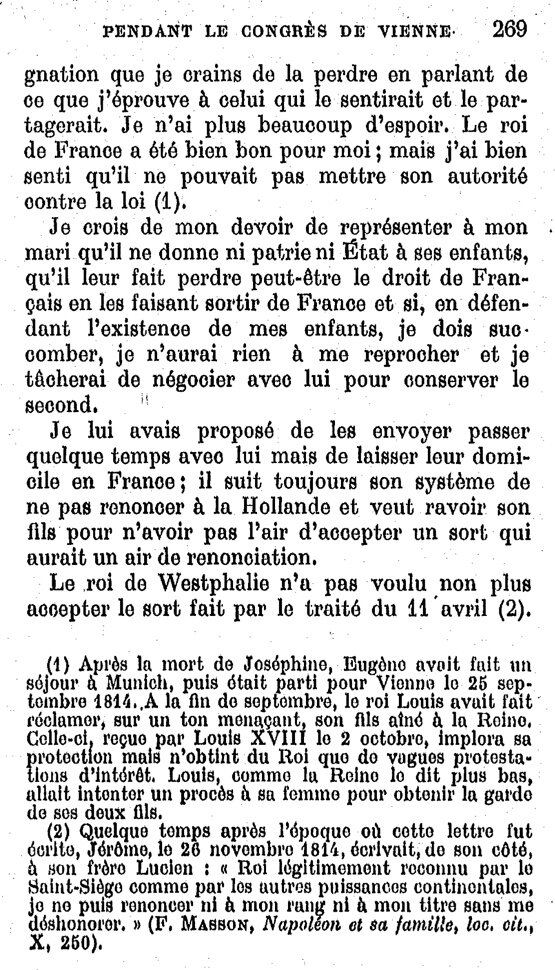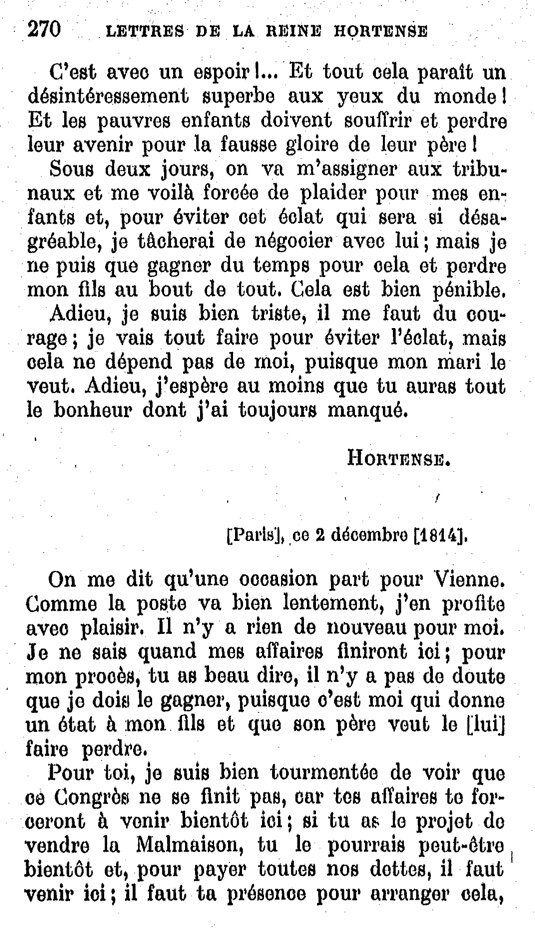In order to make this content available in as many languages as possible I’m now translating Hortense’s letters under each page of the original French below into English. Use the google translate tool if you like.
One of the main controversies between Napoleon and Hortense plays out in the letter below. Hortense frustrated Napoleon somewhat but he respected how she put her sons before him. Hortense believed that putting her sons first served Napoleon’s ultimate best interest. Napoleon was extremely focused on creating a succession for his system through his heirs. As Napoleon’s son was captured quickly in 1814 by his enemies with the help of his mother Marie Louise, it was left to Hortense to preserve Napoleon’s legacy.
While Hortense was trying to keep her sons in France and their chances for the future, her husband Louis was threatening to take them from her. Hortense has been reproached for not doing enough for Napoleon during his stay at Elba - by Napoleon himself - but one sees the impossibility of her situation. To serve Napoleon’s higher interests, she had to save her sons.
Congress of Vienna by Jean Baptiste Isabey
CHAPTER X DURING THE CONGRESS OF VIENNA - HUNDRED DAYS.
LAST LETTERS
After the abdication, Eugene comes to France. He arrived there in time to witness Joséphine's death on May 29, 1814, then he ran to Vienna where the Congress would decide his interests. Hortense, thanks to the benevolence of the Emperor of Russia, obtains from the Bourbons the duchy of Saint-Leu and the respect of the commitments made in his favor towards the Emperor in the treaty of April 11, by which Napoleon settled the fate of his family.
She is very worried at this time about her husband's attempts to take away her two children. A trial begins, the judgment of which will be rendered only a few hours before the Emperor's return to the Tuileries. The Queen hardly speaks except of this trial in her letters and of the small incidents of a life which she wants to believe to be purely mundane. However, the coup de théatre du Golfe Juan soon erupts and we will see how reckless she is at this time.
Paris, November 3, 1814.
My dear Eugene, I do not have the courage to write to you. I'm so sad and I need so much resignation
Eugene de Beauharnais
that I fear losing it in speaking about what I feel with the one who would feel it and share it. I don't have much hope anymore. The King of France has been very good to me; but I felt that he could not put his authority against the law (1).
I believe it is my duty to represent to my husband that he gives neither country nor state to his children, that he perhaps makes them lose the right of French citizenship by making them leave France and if, by defending the existence of my children, I must succumb, I will have nothing to reproach myself with and I will try to negotiate with him to keep the second.
I had offered to send them to spend some time with him but to leave it that their home is in France; he still follows his system of not renouncing Holland and wants his son back so as not to appear to accept a fate which would have an air of renunciation.
The King of Westphalia did not want to accept the fate of the treaty of April 11 either (2).
(1) After Joséphine's death, Eugene had made a stay in Munich, then left for Vienna on September 25, 1814. At the end of September, King Louis had asked, in a threatening tone, for his eldest son from the Queen. The Queen, received by Louis XVIII on October 2, implored his protection but obtained from the King only vague protestations of interest. Louis, as the Queen says below, was going to sue his wife to obtain custody of his two sons.
(2) Some time after the time this letter was written, Jérôme, on November 26, 1814, wrote, for his part, to his brother Lucien: “King legitimately recognized by the Holy See and by the other continental powers, I can neither renounce my rank nor my title without dishonoring myself, ”(F. MASSON, Napoléon et sa famille, loc, cit., X, 250).
It is with hope ... And it all seems superb selflessness in the eyes of the world! And the poor children must suffer and lose their future for the false glory of their father! In two days, I will be assigned to the courts and I am forced to plead for my children and, to avoid this outburst which will be so unpleasant, I will try to negotiate with him; but I can only buy time for that and lose my son at the end of it all. This is very painful. Farewell, I am very sad, I need courage; I will do everything to avoid the glare, but that is not up to me, since my husband wants it. Goodbye, at least I hope you get all the happiness I've always missed.
HORTENSE.
[Paris], this December 2 [1814].
I am told that an opportunity to send you a letter is leaving for Vienna. As the post is going so slowly, I am happy to take this opportunity. There is nothing new here. I don't know when my business will end here; for my trial, you may say, there is no doubt that I should win it, since it is I who gives my son a status and his father wants to make [him] lose it. For you, I am very tormented to see that this Congress does not end, because your business will force you to come here soon; if you have the project of selling Malmaison, perhaps you could do so soon and, to pay all our debts, you have to come here; it takes your presence to fix this
because Soulange (1) and poor Bourgalie understand nothing about it; the latter, even, is very ill, and if you were to come soon, you might not even find him. But all this is little compared to our business that we must finally finish and it's terrible, when we only have jewelry that we cannot sell, and that we have a lot of debts to pay (2). It is said that the dear King of Naples has placed 100 millions in England; it is very fortunate for him and he is safe from all bad luck.
Goodbye, I kiss you. Answer me if you really plan to come and arrange our interests yourself.
HORTENSE.
Murat, King of Naples
(1) Mr. Soulange-Bodin, intendant of Prince Eugène,
(2) Josephine died 3 million in debt.










